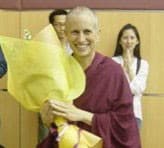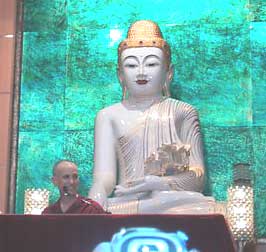Anger and the practice of patience
A talk given at the Kaki Bukit Prison School, Singapore.
Part 1
- Anger exaggerates negative qualities
- Anger brings the opposite of what we want
- Anger shows itself in many ways
- We’re responsible for our anger
Anger and the practice of patience, part 1 (download)
Part 2
- Anger creates dramas in which we’re the star
- Anger depends on perspective
- Self-centeredness creates unhappiness
- The antidote to self-centeredness is love and compassion for others
- Focus on how we treat others rather than how they treat us
- Responding to others in a kind, steady and stable manner indicates strength, not weakness
Anger and the practice of patience, part 2 (download)
Questions and answers: Part 1
- Patience is having a calm mind even though you’re suffering
- Aggression is usually the result of unhappiness
- Responding to others’ suffering depends on the situation
- If gossiping is present, excuse yourself, divert the energy, change the topic, humor
Anger and the practice of patience: Q&A, part 1 (download)
Questions and answers: Part 2
- Learning to be quiet with yourself doesn’t require religious involvement
- Be content with what we have rather than be influenced by society
- Make a positive contribution
- Determine what’s important
- Know your bad habits/weaknesses
- Take the five precepts, preferably in front of a spiritual teacher
Anger and the practice of patience: Q&A, part 2 (download)
Questions and answers: Part 3
- All Buddhist traditions can be traced back to the Buddha
- Each tradition may have helpful methods
- Generate motivation first thing in the morning
- Throughout the day, remember (be mindful of) your motivation
- Review the day
Venerable Thubten Chodron
Venerable Chodron emphasizes the practical application of Buddha’s teachings in our daily lives and is especially skilled at explaining them in ways easily understood and practiced by Westerners. She is well known for her warm, humorous, and lucid teachings. She was ordained as a Buddhist nun in 1977 by Kyabje Ling Rinpoche in Dharamsala, India, and in 1986 she received bhikshuni (full) ordination in Taiwan. Read her full bio.


